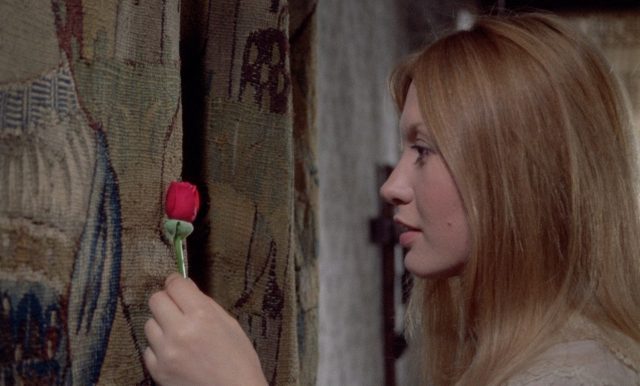Hammer-Rama: Demons of the Mind, by Alexander Miller

The 70s were hard times for Hammer and, ironically, it was also the studio’s most prolific period, despite varying degrees of quality among the varied output of buxom vampires, screwy comedies and Jurassic adventures. Their massively successful Dracula and Frankenstein films were dwindling in appeal; the Count went mod in Dracula A.D. 1972 while other fang sporting monsters were busty lesbians with the start of the Karnstein trilogy. Sex and gore were the studio’s modus operandi; the later years have some high points but one of their great moments from the early 70s had nothing to do with classic monster lore, classic gothic literature or even a whiff of the supernatural. Peter Sykes’ debut feature Demons of the Mind is a beautifully twisted little number that plays like an x-rated Flowers in the Attic set in a far-removed Victorian setting.
Demons of the Mind is set in a Bavarian village where reclusive Baron Zorn (gotta love the name) lords over a god-fearing mass of individuals who are aghast at the immense manor at the top of the hill and mull over what horrors that could possibly be at bay. They might be clannish and a little torch happy but their instincts are on point because all is not well the Zorn manor. Count Zorn (Robert Hardy) is a widow who has imprisoned his son Emil (Shane Briant) and daughter Elizabeth (Gillian Hills) in an attempt to quell their incestuous relationship, occasionally enlisting bleeding, drugging and brainwashing. Matters escalate when the Count enlists a charismatic charlatan doctor Falkenberg (Patrick Magee) to aid in his demented family woes. Falkenberg’s arsenal of hypnotic trinkets create a post-summer of love-informed pseudo mysticism vibe. Time capsule moments like this endear Hammer rather than date them. Yet Demons of the Mind only seems removed in that it has that hazy, soft-focus photography that took over the studio by the end of the 60s–thanks to veteran Hammer cinematographer Arthur Grant, whose filmography boasts over 30 credits for the celebrated house of horror. The porny but trancey look compliments the heady tone. Demons of the Mind trucks in some taboo territories (namely incest) but it’s a break from the other titles of this period in that there’s nothing flattering to the nudity and sex. The matter-of-fact depiction of the potentially sensational material is one of the critical elements that Hammer utilized going back to the heyday of Terrence Fisher and Sykes seems to understand that temperament, giving Demons of the Mind a deliberately compelling aesthetic temperament.
The stately delivery is an ideal platform for the thumping contrast that arrives when the film spins into segues of brilliantly punctuated, brutal violence. Demons of the Mind has its moments of squirm-inducing cruelty alongside some undeniably fun gore. And in the lineage of Hammer horror, it boasts one of the finest staking scenes, which is saying something in contention with the studio’s legendary vampire line.
Demons of the Mind is one of those classic cases of a movie no one asked for or anticipated and, naturally, it tanked at the box office. But, then again, Hammer had more misses than hits. 1972 also brought us the critically favored but commercially middling Vampire Circus. The clumsy, uninspired Fear in the Night and the critically reappraised Straight on Till Morning were yawn-inducing. Christopher Lee got dragged into Dracula A.D. 1972 and, though it’s a dumb-fun look at 1970s London, it happened without revitalizing the series. It seemed like Hammer was in one of their slumps; nothing that they hadn’t made their way out of before. But the 70s proved to be the beginning of the end for the studio that dripped blood–that is, for the 20th century. Demons of the Mind would enjoy a resurgence in the wake of a modern audience, where the sub-genre of folk horror is reevaluated as important cinema.





























